CTP Episode of the Day - 10.05.06 - Mind's Eye
Today's Cherished Episode: Mind's Eye (5x16)
Original Air Date: April 19, 1998
Written By: Tim Minear
Directed By: Kim Manners
A sadistic murderer is on the loose. The only witness to his crimes: a totally blind young woman, who somehow "sees" through the killer's eyes.
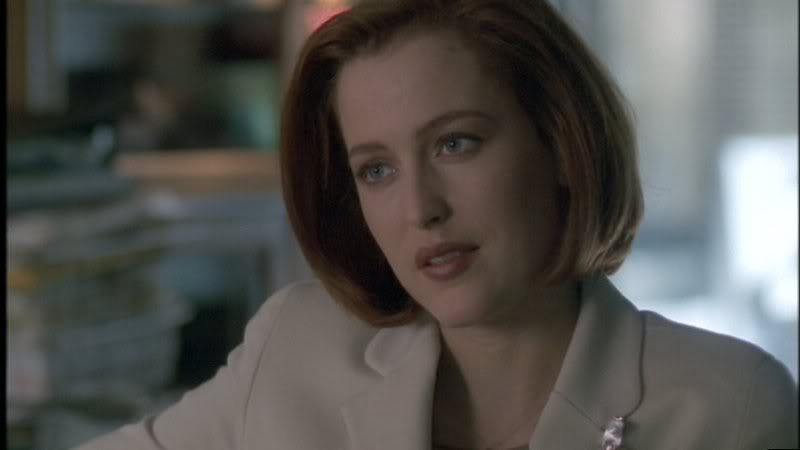
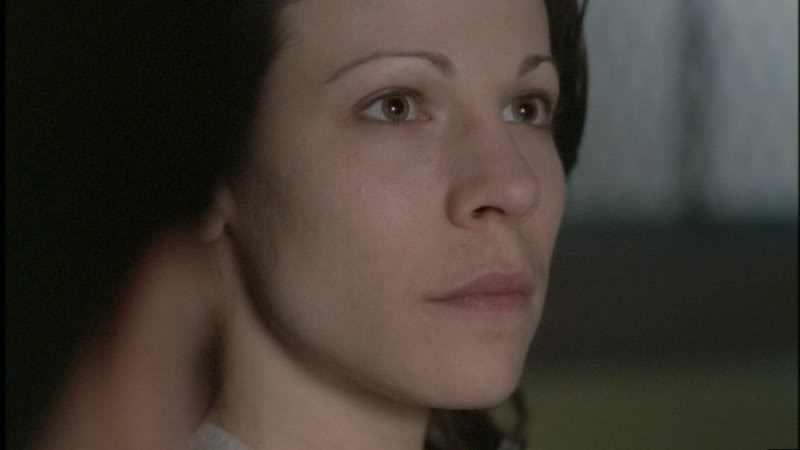
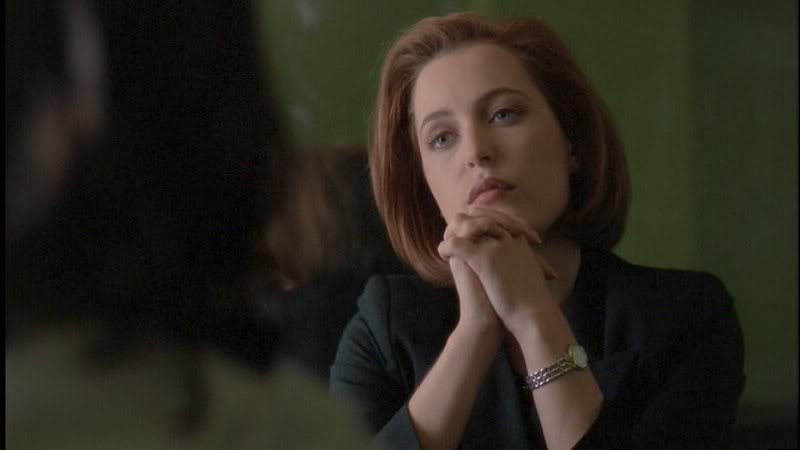
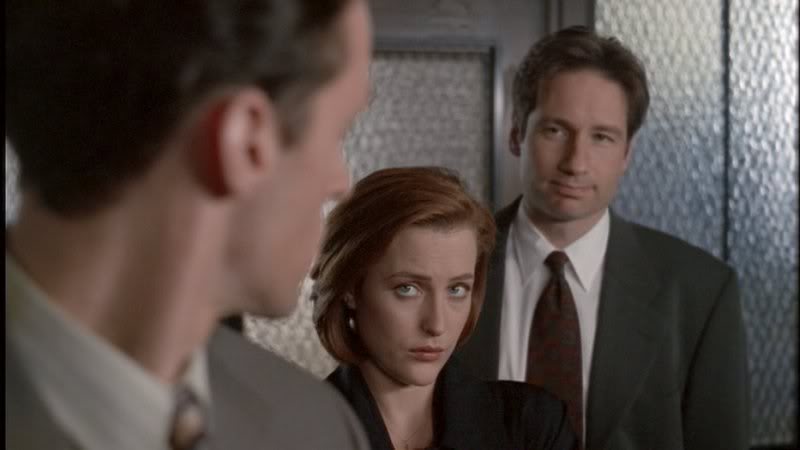
"Why donít we just stop playing games here, okay? I mean you probably donít know a feather duster from a duckís ass, do you? I mean itís ridiculous. Youíre a blind woman, for Godís sake. So why donít you just tell us who did kill Paco Ordonez, and Agent Scully and I can go arrest him, and you can go home and work on your angry-young-blind-girl comedy routine."
Some "Mind's Eye" Tidbits & Musings:
-- The phrase "mind's eye" refers to the human ability for visual perception, imagination, visualization, and memory, or in other words, one's ability to "see" things with the mind. During the episode, Mulder posits that Marty Glenn had some kind of physical response to images in her "mind's eye."
-- The phrase was used, and perhaps originated, in William Shakespeare's Hamlet, most likely written sometime between mid-1599 and mid-1602. In Act 1, Scene 2, Hamlet tells Horatio that he thinks he saw his dead father. "Where, my lord?" asks Horatio. To which Hamlet replied, "In my mind's eye." An interesting correlation to this episode in which Marty Glenn, a blind woman, doesn't see her father but uses her mind's eye to see what her father sees.
-- Timeline: Marty's mug shot from the first murder reads 3/6/98.
-- "Mind's Eye" revolves around the concept of "remote viewing." This sub-group of paranormal theory posits that certain individuals possess the ability to observe events -- either through the eyes of others or on their own -- that occur beyond the range of conventional vision. In the 1970s, the U.S. Central Intelligence Agency underwrote a $20 million research project to determine if remote viewing (a nice ability to have if, say, you're searching for an enemy missile site) actually existed.
-- Another party with a keen interest in the subject was X-Files story editor Tim Minear. "Supposedly," said Minear, "some remote viewers had 'gone' to Mars. It seemed to me that it would be a good topic. But then I thought: It might be a good idea for a short story, but how do you make the whole thing work visually? Then, as it usually happens when you have these unworkable ideas, the best thing is to stop concentrating on it and make the thing about a specific person instead. That's when, for some reason, I hit upon the idea of the remote viewer being blind."
-- "This intrigued me," said Minear, "and I was also intrigued with the idea of doing the story of a blind woman who was not Audrey Hepburn. I wanted to make her a bitch, because the fact is that disability doesn't necessarily ennoble a person. I know I wouldn't be ennobled. In fact, I'd be pissed!"
-- After several intensive story meetings with Frank Spotnitz, John Shiban, and Vince Gilligan (Plus the post-Christmas fizzle of a previously scheduled script), Minear was given the go-ahead for his first solo episode. More good news came during the casting process. "When they sent me off to write it," said Minear, "the guys asked me to think about actors who would be good for Marty. Without hesitation, I said 'Lili Taylor.'"
-- Lili Taylor, the New York-based actress who starred with Julia Roberts in Mystic Pizza as well as in Dogfight, I Shot Andy Warhol, and many other well-regarded independent films, was thought to be decidedly not interested in taking TV guest star roles. Unbeknownst to the production staff, though, Taylor was a fan of the show (as well as a drama school classmate of Gillian Anderson) and had already contacted L.A. casting director Rick Millikan.
-- Millikan said, "Two or three weeks before the script came out, her managers called me and said she would love to do an episode. When 'Mind's Eye' was finished, we all looked at it and said, 'Perfect.'"
-- With these main elements in place, shooting went fairly smoothly. A brief debate broke out, however, when the time came to design and build Marty's apartment. After art director Greg Loewen pointed out that a blind woman wouldn't actually need or use lamps or ceiling lights, the lighting department countered that although The X-Files was a dark show, it wasn't that dark. "To tell you the truth," said Loewen, "I could see their point."
-- "Mind's Eye" gave us one of those infrequent Scully slide shows.
-- Marty was not the only one with some kind of remote vision in this episode. We were told that the police turned the tiny motel bathroom "upside down and inside out" yet Scully was able to find the bloody gloves in an instant while carrying on a cell phone conversation with Mulder.
-- Mulder and Scully were separated for much of this episode for schedule juggling. When Scully decided she had to go back to D.C. to "personally expedite the PCR results," it was really to allow Gillian Anderson time to return to Los Angeles for some last-minute reshoots for Fight the Future.
-- The staccato, nightmarish quality of Marty Glenn's remote visions was created mainly in post-production by visual effects supervisor Laurie Kallsen-George.
-- As documented by his cover profile in Vanity Fair magazine, the wisecrack "even if the gloves do fit, you can still acquit," was an on-set improvisation by David Duchovny. It is, of course, a reference to Johnnie Cochran's famous line during the O.J. Simpson trial; Cochran was Simpson's attorney. There's another reference to the O.J. case found in Marty's line, "Somewhere Marcia Clark weeps." Marcia Clark was one of the prosecutors on the case.
-- "I *like* you, Marty. I *admire* you." And I believe that Mulder does. I was always astonished at the "Mulder Backlash" in this episode from dedicated shippers who thought that Mulder had some kind of "thing" for Marty. The only "thing" I saw that Mulder had for Marty was a great deal of respect and compassion. (And okay, maybe fondness.) I've always thought that Mulder's ability to be compassionate was one of his finest qualities; I think it was comforting to people to have someone willing to believe their story, no matter how strange or unbelievable it might have been. Should he have to stop being compassionate or stop having friends in order to be in a relationship with Scully? I certainly didn't think so.
-- Oopsie! In an editing error, Mulder and Marty can't seem to decide whether to hold hands or not in the last jail scene.
-- "Mind's Eye" provided Mulder's second slam of the Ice Capades in one season. He obviously had some traumatic childhood event at the ice show that caused this problem.
-- Tim Minear studied film at Cal State University in Long Beach, California. He began his professional career in film as a production assistant, then assistant director, on such films as Re-Animator, The Men's Club, Dudes and Platoon. After penning several feature scripts, Tim worked for a time as a "script doctor," re-writing on low budget feature films. He worked on such TV series as The New Adventures of Zorro, Robin's Hoods (for Aaron Spelling), and Two for Stephen J. Cannell before traveling to New Zealand to serve as co-producer on the Rick Springfield syndicated series High Tide. At the beginning of the 1996-97 TV season he joined the writing staff of Lois & Clark: The New Adventures of Superman, then joined The X-Files at the beginning of Season 5.
-- Minear served as Executive Story Editor on The X-Files throughout the fifth season, writing "Mind's Eye" and "Kitsunegari" along the way. He left the X-Files to produce and write for the Buffy the Vampire Slayer spinoff Angel, remaining with that show through its third season when he left to join Joss Whedon's new show Firefly. But because Angel showrunner David Greenwalt left at the same time, he remained involved in the story process for the first seven Season 4 episodes of Angel. After Firefly was cancelled after just 15 episodes, Minear returned to Angel and wrote/directed the Season 4 finale "Home." But he did not return for Angel's fifth season, instead choosing to executive produce the critically-acclaimed (but short-lived) Fox series Wonderfalls.
-- Although still regarded as the "queen of the independent film," Lili Taylor has done other high-profile projects since her guest star appearance on The X-Files. She guest starred on Mad About You, appeared in the HBO movie Live from Baghdad, had a starring role in the remake of the horror film The Haunting with Liam Neeson, Catherine Zeta-Jones, and Owen Wilson, and had a memorable role as Lisa Kimmer who eventually married Nate Fisher on Six Feet Under. In addition to her nomination for The X-Files, she also received an Emmy nomination for her role on Six Feet Under, and the cast of Six Feet Under won a Screen Actor's Guild Award in 2004 for Best Ensemble in a Drama Series. She's been nominated for four Independent Spirit Awards and won in 1994 for her role in Household Saints.
-- For her performance as Marty Glenn in "Mind's Eye," Lili Taylor was nominated for an Emmy Award for Outstanding Guest Actress in a Drama Series.
-- Editor Casey O Rohrs also received an Emmy nomination for Outstanding Single-Picture Editing for a Series for his work on "Mind's Eye."
-- Once & Future Retreads: Blu Mankuma (Detective Pennock) played Claude Peterson in Season 1's "Ghost in the Machine." Peter Kelamis (Assistant D.A. Costa) was O'Dell in "Lazarus," Lieutenant Foyle in "Fresh Bones," and Husband #2 in "Small Potatoes." Colin Lawrence (First Officer) appeared as an Officer in "Avatar" and as a Troop Leader in "Musings of a Cigarette Smoking Man." Rick Dobran (Bartender) played Sergeant Armando Gonzales in "Tempus Fugit/Max." Henry O. Watson (Blue Collar Guy) was the Bailiff in "Pusher."
-- Kim Manners did an excellent job with this episode, using great visual images throughout, from the opening shot of the distorted view through a security mirror, to the final shot where Marty blends into the darkness of her jail cell. Likewise, Tim Minear's script included some snappy lines and excellent dialogue. And Mark Snow's music score was another great addition. Finally, the fine performances all around, especially by Lili Taylor and David Duchovny. IMBO, Duchony showed us a Mulder much in the same vein as "Oubliette" or "The Field Where I Died," a man who does wear his heart on his sleeve and has compassion to spare for someone caught in circumstances they don't understand or know how to control. Taylor and Duchovny had some great chemistry, and that -- in addition to the directing, writing, and music -- made "Mind's Eye" a stand-out stand-alone episode.
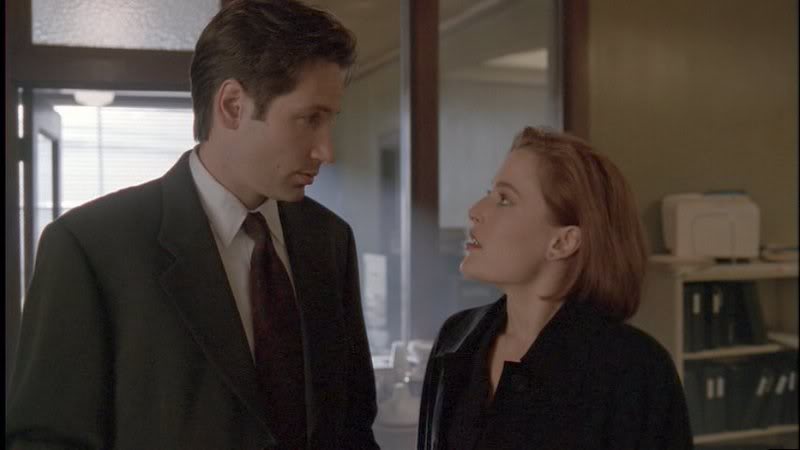
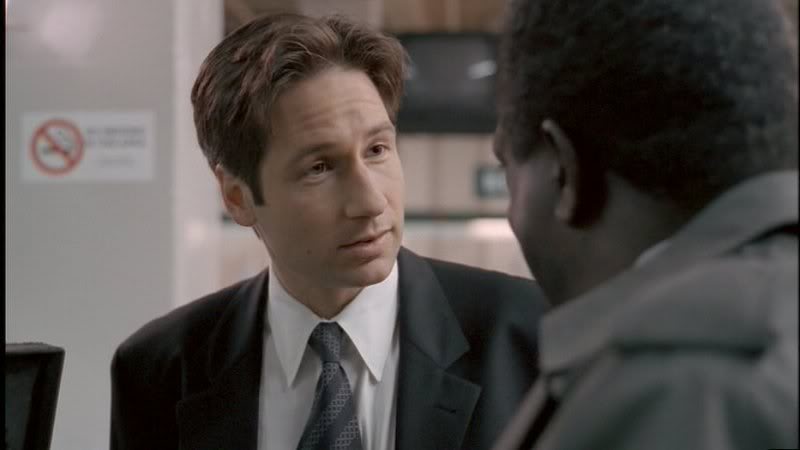
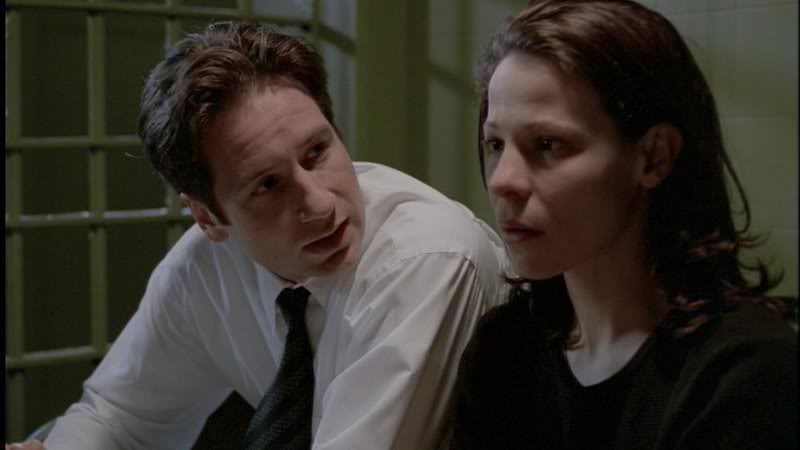
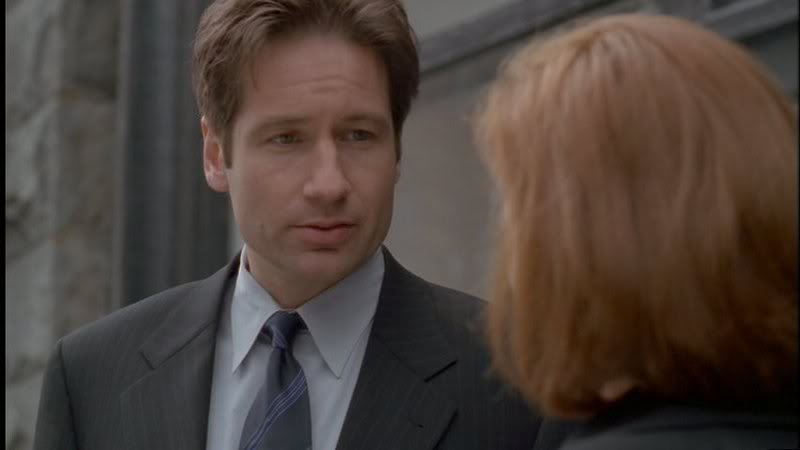
(Thanks to chrisnu for today's pics.)
Please share your first impressions, favorite (or cringe-worthy) moments, classic lines, favorite fanfic, nagging questions, repeated viewing observations, etc., as today we celebrate "Mind's Eye"!
Polly